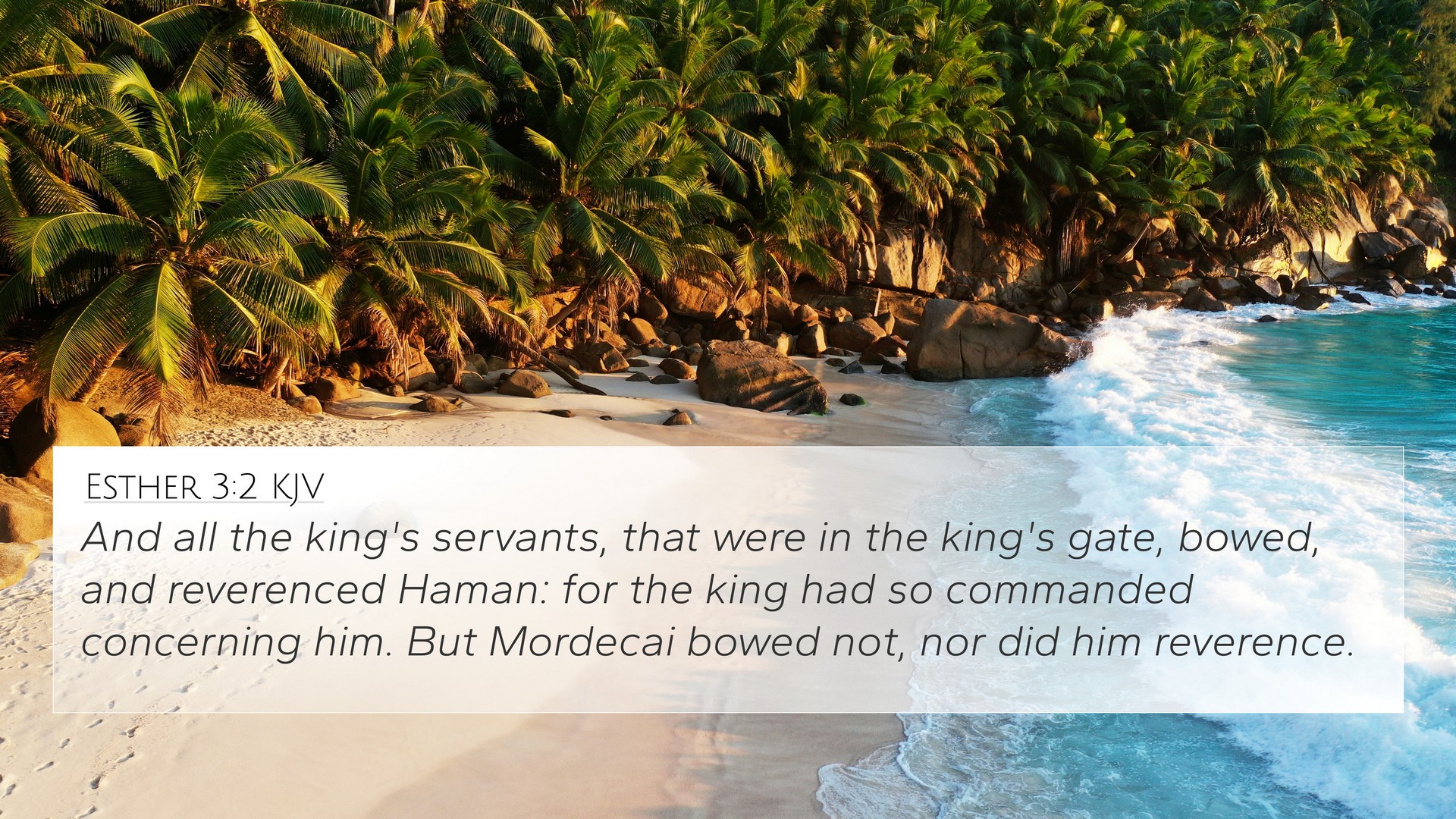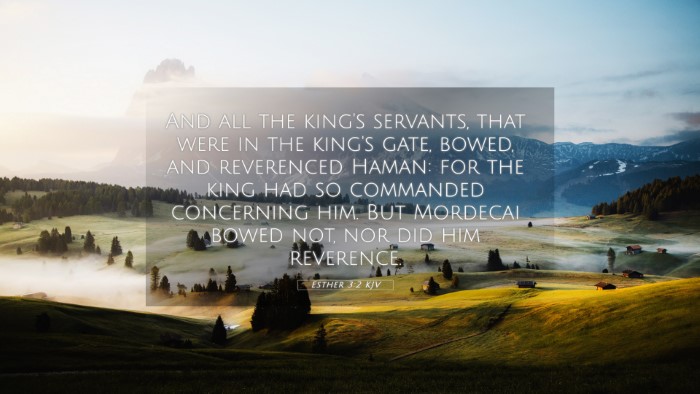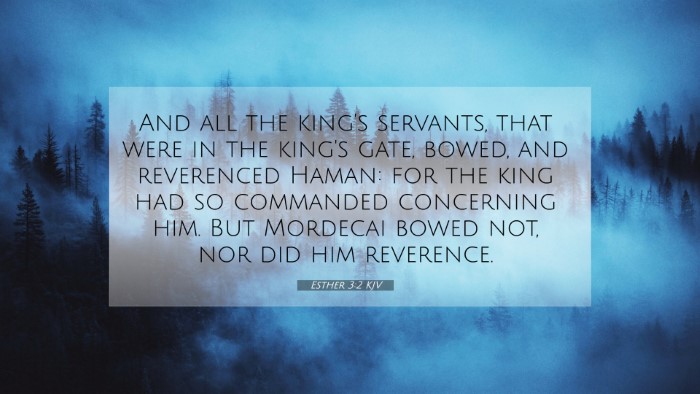Old Testament
Genesis Exodus Leviticus Numbers Deuteronomy Joshua Judges Ruth 1 Samuel 2 Samuel 1 Kings 2 Kings 1 Chronicles 2 Chronicles Ezra Nehemiah Esther Job Psalms Proverbs Ecclesiastes Song of Solomon Isaiah Jeremiah Lamentations Ezekiel Daniel Hosea Joel Amos Obadiah Jonah Micah Nahum Habakkuk Zephaniah Haggai Zechariah MalachiEsther 3:2 Similar Verses
Esther 3:2 Cross References
And all the king's servants, that were in the king's gate, bowed, and reverenced Haman: for the king had so commanded concerning him. But Mordecai bowed not, nor did him reverence.
Uncover the Rich Themes and Topics of This Bible Verse
Listed below are the Bible themes associated with Esther 3:2. We invite you to explore each theme to gain deeper insights into the Scriptures.
Esther 3:2 Cross Reference Verses
This section features a detailed cross-reference designed to enrich your understanding of the Scriptures. Below, you will find carefully selected verses that echo the themes and teachings related to Esther 3:2 KJV. Click on any image to explore detailed analyses of related Bible verses and uncover deeper theological insights.
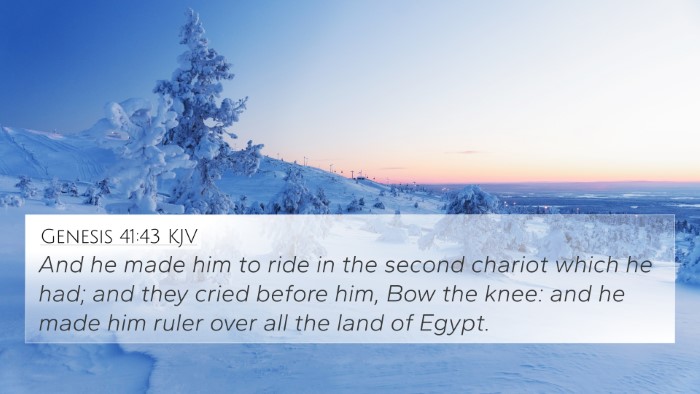
Genesis 41:43 (KJV) »
And he made him to ride in the second chariot which he had; and they cried before him, Bow the knee: and he made him ruler over all the land of Egypt.

Esther 2:19 (KJV) »
And when the virgins were gathered together the second time, then Mordecai sat in the king's gate.
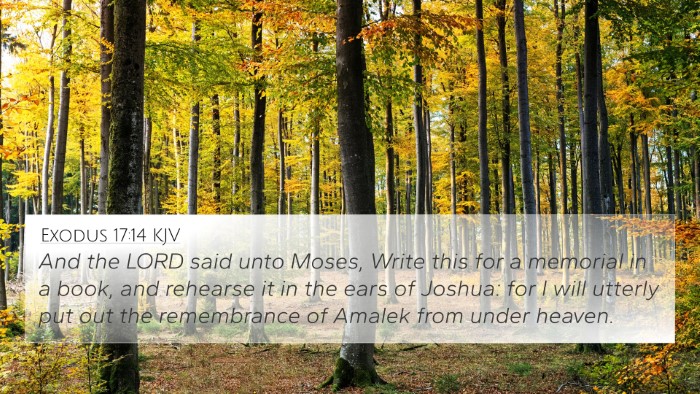
Exodus 17:14 (KJV) »
And the LORD said unto Moses, Write this for a memorial in a book, and rehearse it in the ears of Joshua: for I will utterly put out the remembrance of Amalek from under heaven.
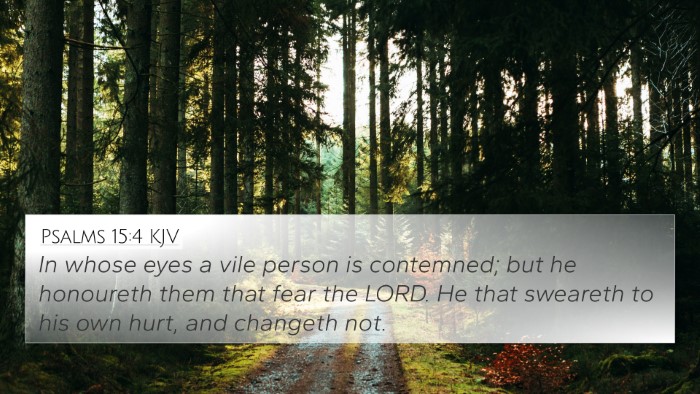
Psalms 15:4 (KJV) »
In whose eyes a vile person is contemned; but he honoureth them that fear the LORD. He that sweareth to his own hurt, and changeth not.
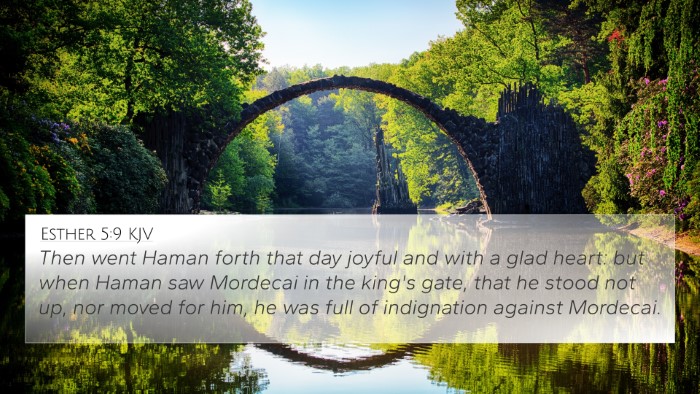
Esther 5:9 (KJV) »
Then went Haman forth that day joyful and with a glad heart: but when Haman saw Mordecai in the king's gate, that he stood not up, nor moved for him, he was full of indignation against Mordecai.
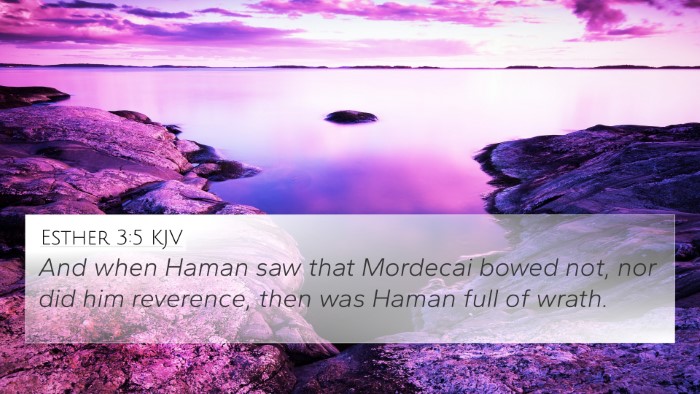
Esther 3:5 (KJV) »
And when Haman saw that Mordecai bowed not, nor did him reverence, then was Haman full of wrath.
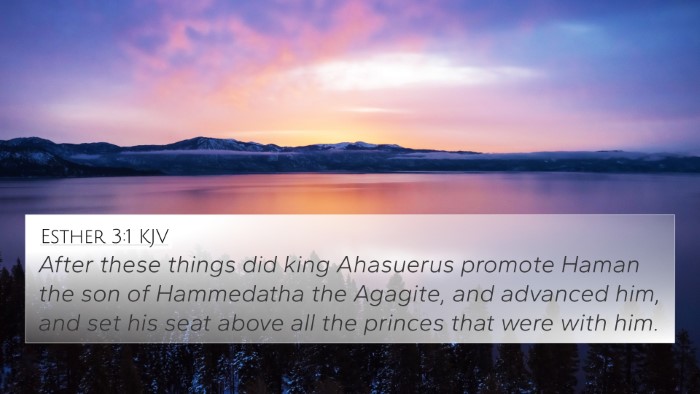
Esther 3:1 (KJV) »
After these things did king Ahasuerus promote Haman the son of Hammedatha the Agagite, and advanced him, and set his seat above all the princes that were with him.
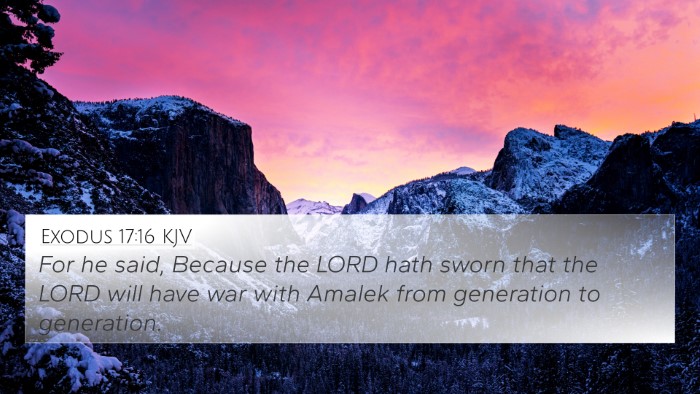
Exodus 17:16 (KJV) »
For he said, Because the LORD hath sworn that the LORD will have war with Amalek from generation to generation.
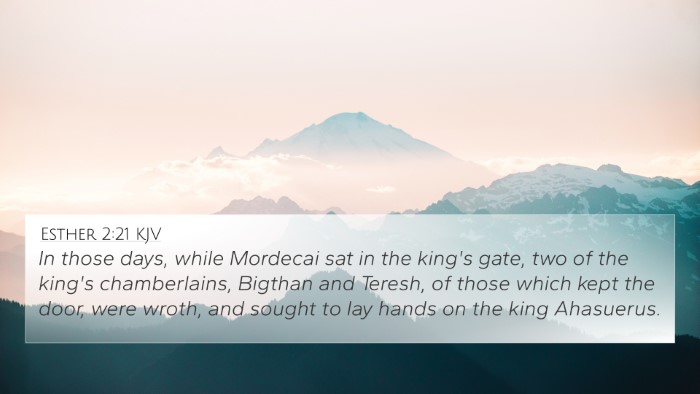
Esther 2:21 (KJV) »
In those days, while Mordecai sat in the king's gate, two of the king's chamberlains, Bigthan and Teresh, of those which kept the door, were wroth, and sought to lay hands on the king Ahasuerus.
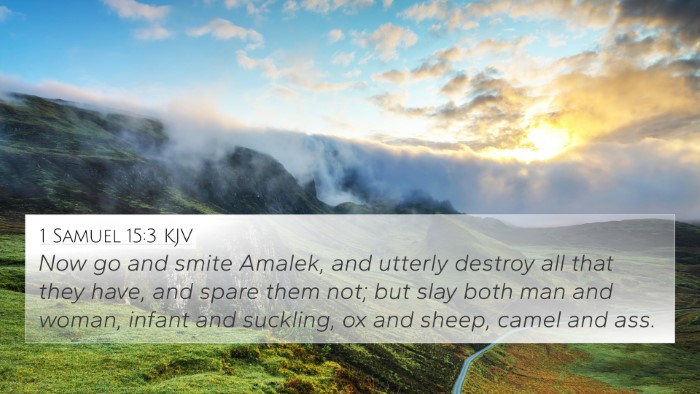
1 Samuel 15:3 (KJV) »
Now go and smite Amalek, and utterly destroy all that they have, and spare them not; but slay both man and woman, infant and suckling, ox and sheep, camel and ass.
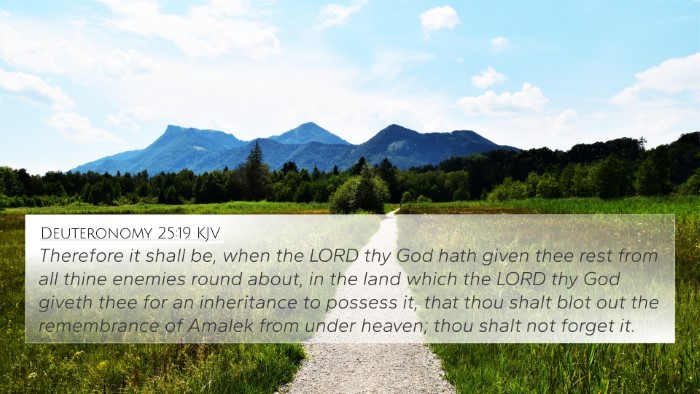
Deuteronomy 25:19 (KJV) »
Therefore it shall be, when the LORD thy God hath given thee rest from all thine enemies round about, in the land which the LORD thy God giveth thee for an inheritance to possess it, that thou shalt blot out the remembrance of Amalek from under heaven; thou shalt not forget it.
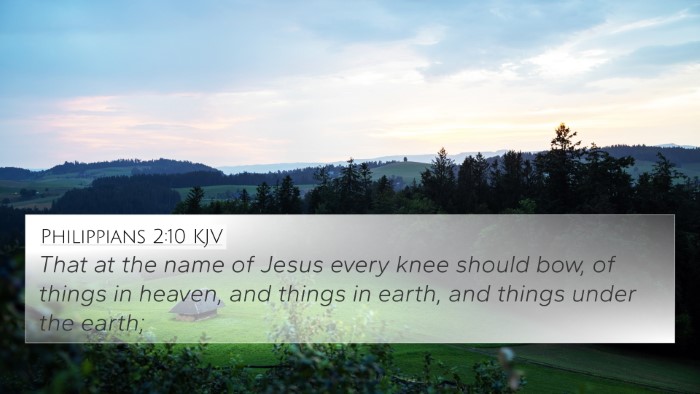
Philippians 2:10 (KJV) »
That at the name of Jesus every knee should bow, of things in heaven, and things in earth, and things under the earth;
Esther 3:2 Verse Analysis and Similar Verses
Esther 3:2 - A Comprehensive Interpretation
Verse: "And all the king's servants, that were in the king's gate, bowed, and reverenced Haman: for the king had so commanded concerning him. But Mordecai bowed not, nor did he reverence him." (Esther 3:2 KJV)
Overview: This verse sets the stage for a crucial conflict in the Book of Esther. It highlights the reverence shown to Haman by the king's servants, contrasting it with Mordecai's refusal to bow. This refusal leads to significant consequences for both Mordecai and the Jewish people.
Significance of Esther 3:2
Mordecai's Defiance: Mordecai's refusal to bow to Haman is both an act of personal conviction and a representation of Jewish identity. According to Matthew Henry, Mordecai's act signifies his allegiance to God over human authority. By not bowing, he openly challenges Haman's authority, which is significant in the context of the ancient Persian court.
The Command of the King: The king’s edict to honor Haman serves as a reminder of how political power can dictate the actions of individuals. Albert Barnes notes that this situation reflects the treacherous dynamics of power and favoritism that often occur in royal courts. The command leads to tension and ultimately tragedy.
Contextual Analysis
The Book of Esther is set during the Persian Empire when Jewish people were exiled. Haman, an Agagite, rises to power and feels entitled to reverence due to his position. This verse illustrates a theme of loyalty and rebellion, emphasizing the moral dilemmas faced by individuals under oppressive regimes.
Reverence for Authority: The bowing of the king's servants is a representation of the expected deference to power. Adam Clarke highlights that this cultural expectation posed a conflict for Mordecai, who, as a Jew, likely held to the belief that his ultimate reverence belongs to God alone.
Bible Verse Cross-References
This verse connects with several other passages in Scripture, which help to enhance our understanding and provide insight into its themes. Here are some significant cross-references:
- Exodus 20:3-5 - The commandment against idolatry and serving other gods relates to Mordecai's refusal to bow to Haman.
- Acts 5:29 - Peter and the other apostles' stance on obeying God over men parallels Mordecai's defiance of Haman.
- Daniel 3:16-18 - Shadrach, Meshach, and Abednego's refusal to worship Nebuchadnezzar's statue illustrates a similar theme of standing firm in faith.
- Proverbs 29:25 - The fear of man brings a snare; Mordecai exemplifies a disregard for the fear of Haman.
- 1 Peter 2:17 - The idea of honoring authority while not compromising one’s faith can be drawn from this New Testament exhortation.
- Philippians 1:27 - Standing firm in one spirit, as Mordecai does, exemplifies the attitude of believers in the face of opposition.
- Isaiah 54:17 - No weapon formed against you shall prosper is a reassurance for Mordecai's faithfulness amidst Haman's rising power.
Thematic Connections
The themes present in Esther 3:2 extend beyond its immediate narrative. They include:
- The Cost of Faith: Mordecai's stand comes at a significant personal cost, reflecting the struggles of maintaining faith in a secular world.
- The Nature of Authority: The dynamics between Mordecai and Haman raise questions about who truly deserves reverence in society.
- Courage Against Oppression: Mordecai’s example encourages believers to stand firm against unjust systems.
Inter-Biblical Dialogue
Esther 3:2 creates an inter-Biblical dialogue through connections with other narratives that involve faithfulness against political oppression. It invites readers to compare it with stories of both the Old Testament and stories of the New Testament believers facing persecution. These connections help to solidify the heroic nature of Mordecai’s character as one who trusts the sovereignty of God even in dire circumstances.
Tools for Bible Cross-Referencing
To explore these connections further, one can utilize:
- Bible Concordances: Useful for finding specific verses related to key terms like "bow," "authority," or "reverence."
- Bible Cross-Reference Guide: A structured tool that helps in tracing themes across the Scriptures.
- Cross-Referencing Bible Study Methods: Engaging with the text through various lenses to uncover deeper meanings.
Conclusion
Esther 3:2 serves as a vital verse that illustrates the conflict between faithfulness to God and the demands of earthly authority. The choices made by Mordecai not only shape his destiny but also the fate of an entire nation. Through cross-referencing and thematic exploration, we uncover layers of meaning that enrich our understanding of the narrative and its application to our lives today.
